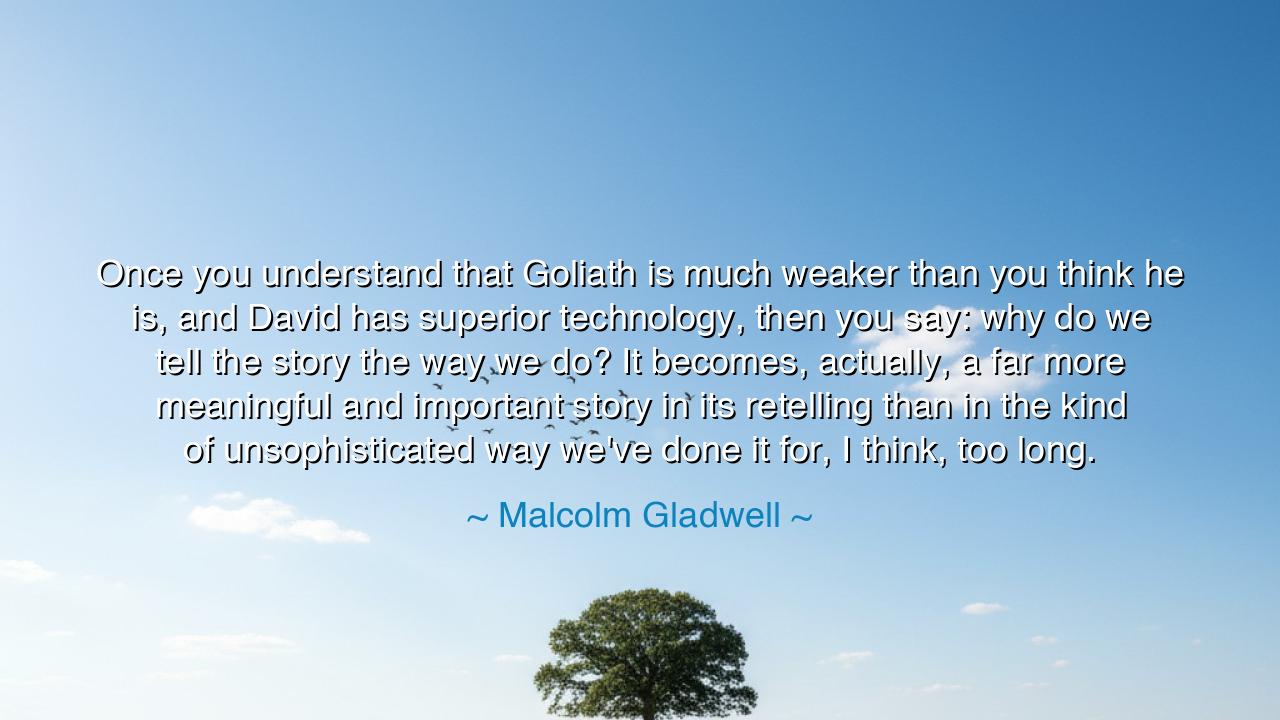
Once you understand that Goliath is much weaker than you think
Once you understand that Goliath is much weaker than you think he is, and David has superior technology, then you say: why do we tell the story the way we do? It becomes, actually, a far more meaningful and important story in its retelling than in the kind of unsophisticated way we've done it for, I think, too long.






The modern sage Malcolm Gladwell once proclaimed: “Once you understand that Goliath is much weaker than you think he is, and David has superior technology, then you say: why do we tell the story the way we do? It becomes, actually, a far more meaningful and important story in its retelling than in the kind of unsophisticated way we’ve done it for, I think, too long.” These words tear away the veil from one of the most enduring tales of old. For he reminds us that truth is often hidden beneath tradition, and that even the greatest stories may need to be retold with sharper eyes and deeper wisdom.
In the ancient telling, David and Goliath is the tale of a boy triumphing over a giant, of weakness defeating strength, of faith overcoming brute force. Yet Gladwell challenges us to see anew: Goliath, though towering and armored, was not the invincible beast we imagine. His size may have masked frailty, his strength was bound in heaviness, and his vision perhaps clouded. David, far from helpless, wielded superior technology—a sling in the hands of a master, a weapon capable of striking with the speed of a bullet. What appears as a miracle of luck or faith is, in truth, also a triumph of skill, strategy, and innovation.
To view it this way does not strip the tale of wonder—it deepens it. For the story is no longer only about divine intervention, but about the wisdom of perceiving the world as it truly is, not as it merely appears. Goliath seemed mighty but was bound by his own size; David seemed small but wielded agility and knowledge. The lesson, then, is not only that the weak can overcome the strong, but that perception is power. Victory belongs to those who can see beyond appearances and harness the tools that lie hidden in plain sight.
History offers a mirror in the tale of the Battle of Agincourt in 1415. The English, led by Henry V, faced overwhelming French forces. To the eye, the French were Goliath—armored knights, vast numbers, prestige. Yet the English wielded their own “slings”: the longbow, superior in range and power. Muddy fields and disciplined strategy turned apparent weakness into decisive strength. Like David, the English triumphed because they understood their true advantage, while their enemies mistook size and might for invincibility. Gladwell’s words echo here, reminding us that battles are not won by appearances, but by truth rightly seen.
So too in the world of invention. Think of the Wright brothers, obscure mechanics in a bicycle shop, facing rivals with great wealth and resources. To the world, they seemed like Davids against the Goliaths of industry and science. Yet their “superior technology”—a deeper grasp of balance, lift, and control—allowed them to fly when all others failed. Once again, the story must be retold: not as a miracle of underdogs, but as a triumph of ingenuity over blindness.
Gladwell’s wisdom reveals that retelling old stories with deeper insight gives them greater meaning. Too often we leave tales in their “unsophisticated” form, content with shallow morals. Yet the truest lessons come when we look closer, question assumptions, and ask: what is hidden here? What truth have we overlooked? The story of David and Goliath is not diminished by retelling—it is made richer, speaking not only of courage, but of perception, strategy, and the eternal truth that strength often hides weakness, while weakness often hides strength.
The lesson for us is clear: do not be deceived by appearances. Do not assume that what seems mighty is unassailable, nor that what seems small is powerless. Ask questions, search deeper, and discover the hidden advantages that others overlook. In your struggles, do not merely pray for miracles—seek out the “sling” that is already in your hand. For victory comes not only through faith, but through the wisdom of seeing the world as it truly is.
So let Malcolm Gladwell’s teaching be carried forward: retell the stories of old, for in their retelling lies deeper truth. Do not be content with shallow lessons, but uncover the hidden wisdom that empowers you to face your own giants. Know this: every Goliath has weaknesses, and every David has strengths waiting to be revealed. Look with new eyes, act with courage, and you too shall turn the battles of your life into stories of meaning for generations to come.






AAdministratorAdministrator
Welcome, honored guests. Please leave a comment, we will respond soon